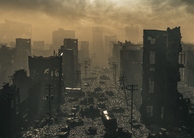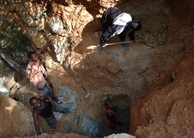Nature or Culture? The Anthropocene as Social Narrative
By
2017, Vol. 9 No. 05 | pg. 1/1 AbstractIs it possible to objectively define the Anthropocene? This essay argues that whether or not it is precisely definable as a geological epoch, its true value, as a concept grounded in futurity, lies within the social realm. The origins of the term are discussed and several hypotheses for defining the Anthropocene are considered. These are linked to earlier accounts of human influence over the environment. Next, the universality of the Anthropocene narrative is challenged, with an emphasis on its cultural and social dimensions. This critique does not seek to diminish its value but refocus it, stressing the potential power of the narrative as a force for positive change at a time when political and scientific decisions may have repercussions which echo into the unimaginably distant future. The term ‘Anthropocene’ was first used in 2000, and refers to the period of time over which humankind has acted as a telluric force, exerting a demonstrable and profound influence over geological and ecological changes. Crutzen and Stoermer (2000), who coined the term, hypothesised that the Anthropocene began in 1784, the year James Watt invented the steam engine. Their research revealed an increase in atmospheric greenhouse gases from this approximate date. Since then, however, several alternate proposals for the Anthropocene have been put forward. Steffen et al. (2011) agreed with the Industrial Revolution as the starting point for the Anthropocene, but argued that since 1945 there has been a ‘Great Acceleration,’ with sharp increases in ‘every indicator of human activity’ that they measured. Zalasiewicz et al. (2015) later asserted this idea more strongly, claiming 1945 and not 1784 as the true beginning of the epoch. Climate change is not anthropogenic so much as sociogenic, a product of modern consumerism, which is in itself reliant upon the technological and social developments that came before.
Yet the theory was not without its critics. As early as 2003, Ruddiman proposed the ‘early Anthropocene hypothesis,’ advancing the idea that it was not the advent of modern industry but of agriculture which precipitated the changes in CH4 and CO2 levels, and hence in the Earth’s climate. According to this perspective, the Anthropocene does not represent a new geological epoch at all, but is ‘coeval with the Holocene’ (Smith and Zader, 2013). Proponents of the early Anthropocene recognise the modern acceleration, but see it as part of a longer, more gradual trend. A staged model has even been proposed to account more holistically for human development, with the earliest stage dating back 2 million years, to when hominids first made use of fire, and the development of agriculture and the Industrial Revolution marking the other stages. (Glikson, 2013).
These contrasting views of the Anthropocene exist primarily because in defining it we are ‘reading the not yet written’ (Colebrook, 2015) – that is, taking the perspective of a scientist of the distant future, imagining how they will perceive the current era. It is impossible to say with any reliability how the Anthropocene will be delineated by our distant descendants. What is clear, however, is that wherever the dividing line is set, an unprecedented acceleration is currently taking place. In 1800 the world’s population was approximately one billion; it is currently over seven billion and rising, and will almost certainly surpass ten billion by the end of the century (Emmott, 2013). As the population grows, so too does the impact human activity has upon the environment. As the population grows, so too does the impact human activity has upon the environment. The scientifically-defined Anthropocene is a recent idea, but this concept of humanity shaping its world is anything but. Previously, Mumford (1934) wrote of the ‘Machine Age’ of the past millennium, where not only human activity but human thought became regulated, and after a fashion, mechanised. Progress for its own sake and the veneration of technology over the natural are characteristic of this outlook, and it can be seen how such a focus might lead to a lack of concern for environmental changes. Earlier still, before Darwinian evolutionary theory had been proposed, Rousseau (1923) charted out a vision of human development, claiming that agriculture and metalwork ‘civilised men, and ruined humanity.’ His explanation of the division of labour and the subsequent development of more complex societies has echoes in the staged and early-Anthropocene hypotheses. Where Rousseau differs from later Anthropocenic narrative, however, is in his presentation of these changes as a ‘consequence of human social life’ (Trachtenberg, 2015). He explicitly connects the sociocultural to the natural. Paradoxically, some accounts of the anthropocene seem almost to bypass this, particularly those positing a very early start date. If the epoch was triggered by hominids mastering fire, then it is a consequence of an innate human trait. Malm and Hornborg (2014) argue that problems such as climate change are not anthropogenic, but ‘sociogenic’: caused not by human nature but by a particular societal setup. Without this understanding, they claim, the Anthropocene serves as an ‘ideology by default,’ and while they reject the dualism evident in such controversially Cartesian questions as ‘nature or culture?’ they want to retain the distinction in analytical terms. The Anthropocene, then, is not wholly a product of human nature, but a consequence of social processes, and the concealment of this, however inadvertent, fuels an ideological strand within its narrative. Satterthwaite (2009) points out that fully one sixth of the world’s population makes a negligible contribution to climate change, and so a growing population in itself cannot be treated as the primary cause. Among those who do contribute, their impact ‘varies by a factor of over 1000.’ It is not that we live, perhaps, but how we live that makes the difference, and here lies the true value of the Anthropocene: in its ‘conceptual utility,’ (Moore, 2015), in the social narrative it provides to help shape our understanding of the world. Scientific history, Dukes (2011) writes, should be ‘rational, global and evolutionary,’ but a nuanced understanding of this requires that it not be positioned as value-neutral, but considered within context. Without modern consumerist society, the Anthropocene as it is today perceived would not exist. What are the problems we face? The population is rising, exponentially. The increase in greenhouse gases goes far beyond the usual variations of the glacial-interglacial cycle, and into unknown territory – and it is suggested that when global shifts occur, they are not gradual but catastrophically swift (Pearce, 2006). Moreover, there is a ‘gulf between science and politics,’ (Tickell, 2011) where an insistence that technology will solve environmental problems borders on the hubristic. Take, for instance, the Onkalo project to contain nuclear waste for 100,000 years, until it is harmless (Into Eternity, 2010). The project is a positive one, and certainly far superior to inaction, but the belief that anything of human creation will survive, and will be comprehended, over such a vast stretch of time seems unfounded. The scale is almost beyond human comprehension, and even if it were guaranteed success, Onkalo will hold only a fraction of the planet’s nuclear waste. In ten thousand years, in a hundred thousand, if humanity remains extant then the gap between 1784 and 1945 will have paled into insignificance. Narration along a grander scale transcends current chronocentrism. When the Anthropocene can be said to begin depends solely upon how it is defined, but even the acceptance of the ‘early Anthropocene’ cannot be allowed to detract from the problems which humanity faces now. Climate change is not anthropogenic so much as sociogenic, a product of modern consumerism, which is in itself reliant upon the technological and social developments that came before. It is not a matter solely of human nature, nor of society and culture, but something born of both. The details matter less than the framing of the social narrative: human action has brought us to this point, and the future ahead is dependent upon both the ideology influencing our decisions and the ways in which we conceive of our future as a species. ReferencesColebrook, C. (2015), 'Framing the End of the Species: Images Without Bodies,' in Death of the Posthuman: Essays on Extinction Volume 1, Ann Arbor: Open Humanities Press, pp.9-28. Crutzen, P. and Stoermer, E. (2000), 'The "Anthropocene,"' Global Change Newsletter, 41, pp. 17-18. Dukes, P. (2011), Minutes to Midnight: History and the Anthropocene Era from 1763, London: Anthem World History. Emmott, S. (2013), 10 Billion, London: Penguin. Glikson, A. (2013), 'Fire and human evolution: The deep-time blueprints of the Anthropocene,' Anthropocene, 3, pp.89-92. Into Eternity (2010), Directed by Michael Madsen [Film], Finland: Films Transit International. Malm, A. and Hornborg, A. (2014), 'The geology of mankind? A critique of the Anthropocene narrative,' The Anthropocene Review, 1(1), pp.62-69. Moore, A. (2015), 'Anthropocene anthropology: reconceptualizing contemporary global change,' Journal of the Royal Anthropological Institute, 22(1), pp.27-46. Mumford, L. (1934), Technics and Civilization, London: Routledge & Kegan Paul. Pearce, F. (2006), The Last Generation: How Nature Will Take Her Revenge For Climate Change, London: Eden Project. Rousseau, J-J (1923), The Social Contract and Discourses by Jean-Jacques Rousseau, London: J.M. Dent and Sons. Ruddiman, W. (2003), 'The Anthropogenic Greenhouse Era Began Thousands of Years Ago,' Climatic Change, 61(3), pp.261-293. Satterthwaite, D. (2009), 'The implications of population growth and urbanization for climate change,' Environment and Urbanization, 21(2), pp.545-567. Smith, B. and Zeder, M. (2013), 'The onset of the Anthropocene,' Anthropocene, 4, pp. 8–13. Steffen, W., Grinevald, J., Crutzen, P. and McNeill, J. (2011), 'The Anthropocene: conceptual and historical perspectives,' Philosophical Transactions of the Royal Society A: Mathematical, Physical and Engineering Sciences, 369, pp.842-867. Tickell, C. (2011), 'Societal responses to the Anthropocene,' Philosophical Transactions of the Royal Society A: Mathematical, Physical and Engineering Sciences, 369, pp.926-932. Trachtenberg, Z. (2015), 'Anticipating the Anthropocene,' Earth's Future, 3(9), pp.313-316. Zalasiewicz, J., Waters, C., Williams, M., Barnosky, A., Cearreta, A., Crutzen, P., Ellis, E., Ellis, M., Fairchild, I., Grinevald, J., Haff, P., Hajdas, I., Leinfelder, R., McNeill, J., Odada, E., Poirier, C., Richter, D., Steffen, W., Summerhayes, C., Syvitski, J., Vidas, D., Wagreich, M., Wing, S., Wolfe, A., An, Z. and Oreskes, N. (2015), 'When did the Anthropocene begin? A mid-twentieth century boundary level is stratigraphically optimal,' Quaternary International, 383, pp.196-203. Suggested Reading from Inquiries Journal
Inquiries Journal provides undergraduate and graduate students around the world a platform for the wide dissemination of academic work over a range of core disciplines. Representing the work of students from hundreds of institutions around the globe, Inquiries Journal's large database of academic articles is completely free. Learn more | Blog | Submit Latest in Environmental Studies |


















